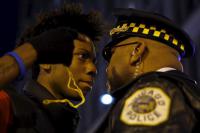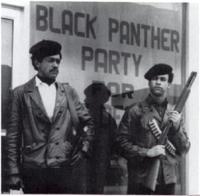-
Data on taxi routes and points of interest could improve crime predictions

Data on how taxis travel through communities and on how people label points of interest on social media could help analysts and criminologists better understand neighborhood crime rates in a city. Analysis of data from points of interest in Chicago — including restaurants, shops, nightclubs, and transit stations — designated by members of FourSquare, a social media site, along with the city’s taxi flow information, offered significantly more accurate estimates of crime rates compared to traditional means. Crime analysts currently mainly rely on demographic and geographic data to study crime and predict trends.
-
-
Texas, UT ask judge to throw out lawsuit challenging campus carry
The Texas Attorney General’s Office and University of Texas at Austin on Monday asked a federal judge to throw out a lawsuit brought by three UT-Austin professors seeking to keep guns out of their classrooms despite the state’s new campus carry law. Three professors have argued that the law, which went into effect 1 August, will stifle discussion in their classrooms. The professors say they fear that guns present during class discussions will cause people to censor themselves out of concerns for their safety.
-
-
SayVU security app – developed by a BGU graduate student -- deployed at Rio Olympics

A new app, SayVU, conceived as a graduate student project at Ben-Gurion University of the Negev, is being deployed at the 2016 Rio Olympics. International Security & Defense Systems (ISDS), the security integrator for the Olympics, selected SayVU as one of the Israeli technologies being used to protect attendees. SayVU enables a user to send a distress signal to an emergency hotline even if a phone is locked and without having to access the application. The message can be sent in a number of ways; shaking the device, tapping the camera button, or simply speaking into the phone.
-
-
Mass shootings driven by "media contagion": Study
The prevalence of mass shootings has risen in relation to the mass media coverage of them and the proliferation of social media sites that tend to glorify the shooters and downplay the victims, a new study finds. “If the mass media and social media enthusiasts make a pact to no longer share, reproduce, or retweet the names, faces, detailed histories, or long-winded statements of killers, we could see a dramatic reduction in mass shootings in one to two years,” says one of the study’s authors.
-
-
Live-streaming crime incidents a challenge U.S. privacy law
In July, the fatal police shootings of Alton Sterling and Philando Castile went viral on social media. The aftermath of the Castile shooting was first shared via Facebook Live, which is a type of mobile streaming video technology (MSVT) that allows users to stream live video to followers, similar to Periscope and Meerkat. The two incidents focus attention on the legal rights of people to record and live stream and any potential right to be free from being recorded and streamed in public places.
-
-
600 armed police officers to protect London
The London police has launched Operation Hercules in which additional firearms officers will be deployed in visible roles in the capital. The Met will add 600 additional firearms officers to protect London against any attack. The first are now fully trained and operationally ready.
-
-
Public safety consolidation works well for some communities, but not for others
In the first comprehensive work of its kind, a Michigan State University criminologist has completed a study on the implementation and outcomes of public safety consolidation — the merging of a city’s police and fire departments. The study finds that while public safety consolidation can work well for some communities, it is not the best solution for others.
-
-
Reducing U.S. firearm suicide rates

In 2014, of the more than 33,500 firearm deaths in the United States, over 21,000 were the result of suicide. Studies in the United States showed that greater firearm availability is associated with greater risk of firearm suicide. Globally, four studies in other developed countries found that per capita gun ownership correlates with national firearm suicide rates. To reduce firearm suicide rates in the United States, the authors recommended several measures, such as targeted legislation to limit firearm access to individuals at risk for suicide, using smart gun technology, offering public education on firearm suicide, and research to evaluate the effectiveness of prevention methods.
-
-
Crime victims should call the police

As law enforcement agencies, community organizations, and public health officials work to develop effective crime-prevention strategies, new research finds that individuals who report being victims of crime to police are less likely to become future victims of crime than those who do not report their initial experiences.
-
-
U.S. police killed or injured more than 55,000 people during “legal interventions” in 2012

U.S. police killed or injured an estimated 55, 400 people during legal stop and search incidents and arrests in 2012, new research finds. Blacks, Native Americans, and Hispanics had higher stop/arrest rates per 10,000 of the population than Whites and Asians. And Blacks were by far the most likely to be stopped, and then arrested, the data show. “As the U.S. struggles to reduce citizen injuries during police contacts, it would seem prudent to train at-risk groups about appropriate behavior during police stops,” the researchers conclude.
-
-
Most guns recovered by Pittsburgh police not in possession of legal owners
Nearly 80 percent of perpetrators carrying a gun recovered by Pittsburgh Police were not the lawful owners, a strong indication that theft and trafficking are significant sources of firearms involved in crimes in southwest Pennsylvania, a new study finds. The finding suggests a timely opportunity for collaboration between public health and law enforcement officials better to understand and reduce violent crimes involving firearms.
-
-
Syrian asylum-seeker who blew himself up in Ansbach, Germany, was about to be deported
A 27-year old Syrian refugee whose asylum application had been denied, and who was about to be deported to Bulgaria, blew himself up Sunday evening outside a wine bar in the Bavarian town of Ansbach. Twelve people were injured in the explosion, three of them seriously. The past week was a particularly violent week in Germany, with a 21-year-old Syrian refugee knifing a woman to death in the city of Reutlingen on Sunday, and a mentally unstable 17-year old German teenager of Iranian descent, who was obsessed with mass shooting, killing nine people on Friday in a shopping mall in Munich, before turning his gun on himself.
-
-
U.K. reviews security measures for large outdoor events
Amber Rudd, the new British home secretary, told the House of Commons that she has ordered a full review of the security measures taken to protect large outdoor events such as festivals and other public gatherings. The review comes in the wake of the attack in Nice on revelers celebrating Bastille Day. Rudd said that additional security measures will be put in place, including what is known as the “national barrier asset” when police assess that there is a risk of vehicle attacks.
-
-
3D printing: a new threat to gun control and security policy?
The threat of self-manufactured firearms is not new, but a critical barrier is collapsing. Until recently, most people did not have the skills to make a weapon as capable as commercially available ones. However, recent developments in the field of additive manufacturing, also known as 3D printing, have made home manufacturing simpler than ever before. The prospect of more stringent gun safety legislation is also fueling interest in at-home production. The worst threats 3D printing poses to human life and safety are likely some distance in the future. However, the harder policymakers and others work to restrict access to handguns or unconventional weapons, the more attractive 3D printing becomes to those who want to do harm.
-
-
Shooter motivated by 1960s-era Black Nationalism

Gavin long, 29, who shot and killed three policemen in Baton Rouge before being fatally shot by the police, appears to have been motivated by 1960s-era Black Nationalism, which called on African Americans to take a strong, even violent, stance against mistreatment by authorities. Long left a long trail of on-line material, both postings and videos. In another video, referring to Native Americans, Long said, “When they were extincted [sic] by the same people that run this country, my question to you, just something you can think about: At what point should they have stood up?”
-
More headlines
The long view
How Male Grievance Fuels Radicalization and Extremist Violence
Social extremism is evolving in reach and form. While traditional racial supremacy ideologies remain, contemporary movements are now often fueled by something more personal and emotionally resonant: male grievance.
